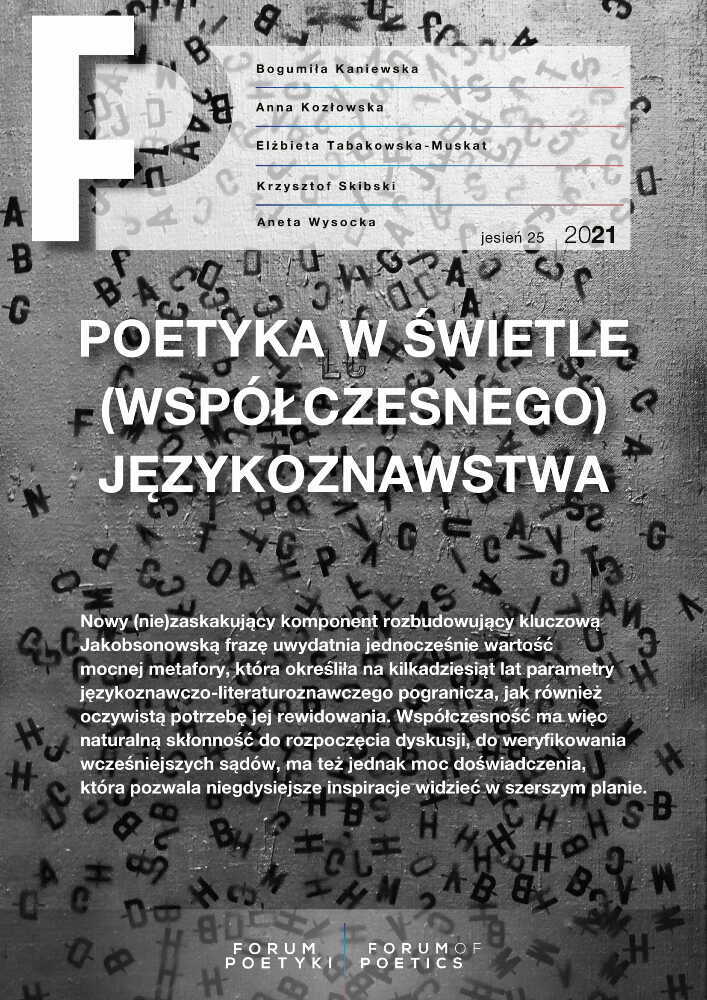Abstract
The article illustrates the thesis – which has been put forward in recent years by many linguists and literary scholars – that a closer connection between linguistics and literary studies may prove useful and inspiring for both fields. The analysis of Julian Tuwim’s poem Życie [Life] demonstrates that such interdisciplinary, or in fact transdisciplinary, methodological framework combining poetics and linguistics, and specifically cognitive linguistics, proves very productive. The English translation of Tuwim’s poem is also analyzed in the article. A review of various studies in cognitive linguistics shows that the “poetics of grammar” in the poem in question is achieved by means of: (i) verbal prefixes, (ii) verbal aspect, and (iii) quantitative iconicity of sequence. The (intuitive, impressionistic) interpretations of Życie quoted in the article turn out to be fully consistent with the grammatical interpretation. The English translation of the poem discussed in the final part of the article proves inadequate, not because of the incompetence of the two translators, but because of systemic grammatical discrepancies. Therefore, it further supports the thesis that a significant part of the meaning of the analyzed poem is contained in its grammatical structure. The poet’s (and the reader’s) intuition confirms the linguistic analysis, and the linguistic analysis validates theoretical and literary interpretations.
References
Ejsmunt-Wieczorek, Izabela. „Tautologia przedrostków werbalnych w gwarach”, Rozprawy Komisji Językowej ŁTN 63 (2016): 5–16.
Evans, Vyvyan. Leksykon językoznawstwa kognitywnego. Tłum. zespół. Kraków: Universitas, 2007.
Freeman, Margaret. „Blending and beyond: Form and feeling in poetic iconicity”. W: Jaén Isabel, Julien Simon (eds.). Cognitive Literary Studies: Current Themes and New Directions, 127–143. Texas University Press, 2012.
Habrajska, Grażyna, Joanna Ślósarska (red.). Habrajska, Grażyna, Joanna Ślósarska (red.). Kognitywizm w poetyce i stylistyce. Kraków: Universitas, 2006.
Harrison, Chloe. Cognitive Grammar in Contemporary Fiction. Amsterdam/Filadelfia: John Benjamins, 2017.
Harrison, Chloe, Louise Nuttal, Peter Stockwell, Wenjuan Yuan (red.). Cognitive Grammar in Literature. Amsterdam/Filadelfia: John Benjamins, 2014.
Lakoff, George, Mark Johnson. Metaphors we live by. Chicago: The University of Chicago Press, 1980.
Libura, Agnieszka (red.). Amalgamaty kognitywne w sztuce. Kraków: Universitas, 2007.
Malcolm, David, Agata Miksa (tłum.). Till the words draw blood! Słowem do krwi! Wiersze Juliana Tuwima. Łódź: DOM LITERATURY w Łodzi, 2013.
Mazurkiewicz, Filip. „Doświadczyć doświadczenie (według Ryszarda Nycza)”. Pamiętnik Literacki 3 (2014): 239–244.
Nycz, Ryszard. Poetyka doświadczenia. Teoria – nowoczesność – literatura. Warszawa: Instytut Badań Literackich PAN – Wydawnictwo, 2012.
Paszek, Paweł. Pisanie doświadczenia: Poetologia i podmiotowość w twórczości Aleksandra Wata i Leo Lipskiego. https://rebus.us.edu.pl/bitstream/20.500.12128/683/1/Paszek_Pisanie_doswiadczenia.pdf, 2017. Dostęp 4.06.2021.
Piwowar, Jolanta. „Funkcje prefiksów «prze-» i «roz-»” w dwóch współczesnych słownikach języka polskiego”. Prace Językoznawcze 2 (2000): 125–138.
Rudzka-Ostyn, Brygida. „Cognitive grammar and word formation. The caase of Dutch uit and Polish wy-”. W: Kałuża, Irena, Marta Gibińska, Irena Przemecka, Elżbieta Tabakowska (red.), Litterae et Litterae et Lingua. In honorem Premislai Mroczkowski, 227–239. Wrocław: Ossolineum, 1984.
Semino, Elena, Jonathan Culpeper (red.). Cognitive Stylistics. Language and cognition in text analysis. Amsterdam/Filadelfia: John Benjamins, 2002.
Stockwell, Peter. Cognitive Poetics: An Introduction. Londyn: Routledge, 2002.
Śmiech, Witold. Derywacja prefiksalna czasowników polskich. Wrocław–Warszawa–Kraków–Gdańsk–Łódź: Zakład Narodowy im. Ossolińskich – Wydawnictwo Polskiej Akademii Nauk, 1986.
Winiecka, Elżbieta. „Literaturoznawcza republika marzeń”. Forum Poetyki 15-16 (2019): 126–132.
License
Authors of articles are responsible for securing the rights to other publications (texts, tables, drawings and other illustrations) quoted or reproduced in their texts.

